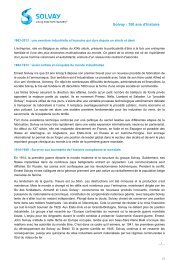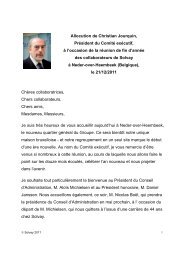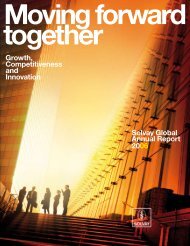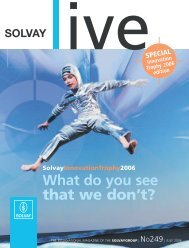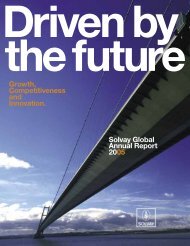2009 Reference document - Solvay
2009 Reference document - Solvay
2009 Reference document - Solvay
You also want an ePaper? Increase the reach of your titles
YUMPU automatically turns print PDFs into web optimized ePapers that Google loves.
3 Rhodia’s<br />
44<br />
Responsibilities and Sustainable Development<br />
commitments to its employees<br />
The APDI facilitates the training and transfer process at Rhodia.<br />
In fact, during this interview, a manager and employee make an<br />
in-depth analysis of behavior and technical aspects, in order to identify<br />
strong points and areas for improvement. They then determine the<br />
development tracks necessary for individual performance. This<br />
analysis allows for reflecting on professional advancement and its<br />
inclusion in the Group’s transfer and career management process.<br />
3.3.3.1 Transfer management policy<br />
and process<br />
The challenge of the transfer policy is to encourage in-house transfers<br />
of employees while capitalizing on local employees’ expertise and<br />
skills. Its implementation is based on coordinated international<br />
management of the different job categories.<br />
Led by the Group Human Resources network, the transfer process is<br />
applied in each country for positions created locally. For international<br />
positions essentially concerning executives, transfers are organized<br />
by Geographic Zone . At the same time, through the “career<br />
opportunities” section on the Intranet, employees can learn of and<br />
apply for positions to be filled within the entire Group.<br />
The transfer process is based on two tools widely disseminated within<br />
the Group:<br />
1 the Progression, Development and Succession Plan (PDSP),<br />
“intended to anticipate changes and replacements to be made”<br />
<strong>Reference</strong> Document Rhodia <strong>2009</strong><br />
is sent to all managers. Disseminated worldwide according to<br />
a very strict annual schedule, it allows for preparing succession<br />
plans on the basis of individual advancement plans;<br />
1 the advance planning of jobs and skills involves all job categories.<br />
It involves a collective approach implemented within the Group,<br />
which translates in France in particular into agreements with<br />
corporate partners.<br />
The performance of the transfer process is currently measured by<br />
in-house and geographic transfer criteria.<br />
In-house transfers<br />
In <strong>2009</strong>, in-house transfers of Group executives were estimated at<br />
20%. More specifically, 16.5% of Group executives received a lateral<br />
transfer or a promotion, of which 3.5% were international.<br />
Geographic transfers<br />
Due to the economic difficulties experienced in <strong>2009</strong>, the number<br />
of employees receiving international transfers decreased and this<br />
occurred proportionately to the change in Group staff.<br />
This decrease is associated with the limitation of new assignments<br />
in <strong>2009</strong> combined with numerous returns due to the expiration of<br />
expatriation contracts.<br />
2004 2005 2006 2007 2008 <strong>2009</strong><br />
Number of expatriates, “opportunity assignments,”<br />
and short-term assignments 121 111 137 132 114 106<br />
Breakdown of employees receiving international transfers by geographical zone as of December <strong>2009</strong><br />
Area Expatriates NCC/MILD Opportunity + Short-term Assignments Total<br />
Asia 33 16 2 51<br />
Europe 13 10 3 26<br />
Latin America 7 1 0 8<br />
North America 7 13 1 21<br />
TOTAL 60 40 6 106<br />
3.3.3.2 Training management policy<br />
and process<br />
Rhodia’s training policy aims to provide the Group’s 13,581<br />
employees with the same number of hours of training regardless of<br />
their position, the unit they belong to or their geographical location.<br />
To train the largest number of employees, Rhodia has chosen to value<br />
the wealth of internal knowledge by relying on the skills of some<br />
employees, who agree to give their time above and beyond their<br />
specific job to share their expertise for the benefit of those interested<br />
in it. External training programs are thus limited to the acquisition<br />
of new skills or the enrichment of internal programs.


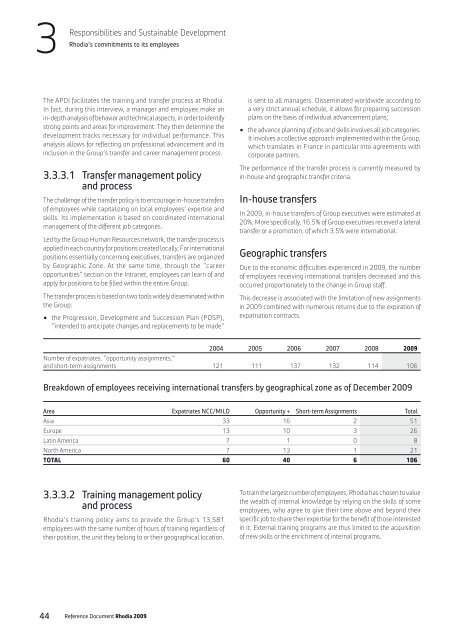

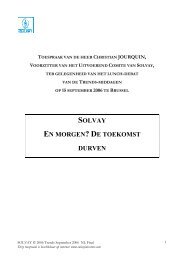
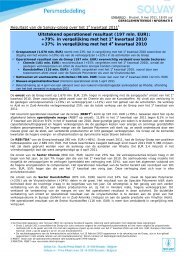
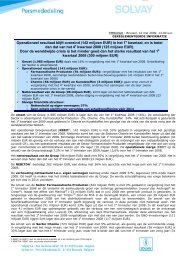

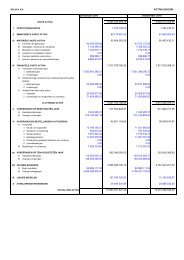
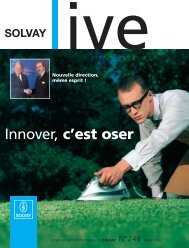
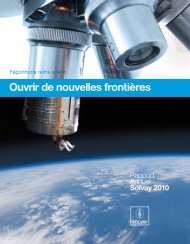
![PROC.1 [LETTRE] - Solvay](https://img.yumpu.com/16585746/1/184x260/proc1-lettre-solvay.jpg?quality=85)
